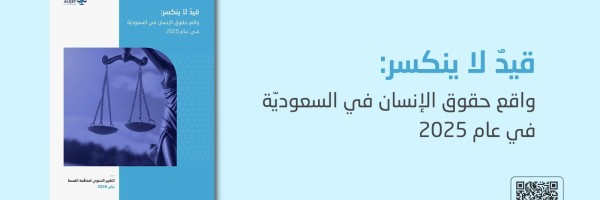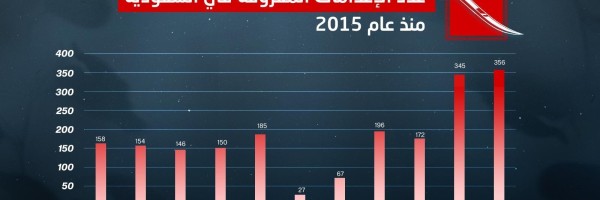The implausible claim that a Shi’a man executed in Saudi Arabia last week had joined a terrorist cell affiliated to Al Qaeda – a charge that did not appear anywhere in the court documents relating to his trial and sentencing – represents a flagrant example of the Saudi authorities' determination to brand legitimate dissent and protest as a form of terrorism.
On 17 August 2024, Saudi Arabia’s Interior Ministry announced the execution of Abdulmajeed bin Hassan bin Abdullah Al Nimr on charges that included “joining a terrorist cell affiliated to the terrorist organisation Al Qaeda”, “financing terrorism and terrorist acts”, and “supporting terrorist ideology”. Al Nimr, 59, belongs to Saudi Arabia’s Shi'a religious minority, who are routinely demonised by groups such as al-Qaeda, raising serious questions about the credibility of these charges.
However, court documents reviewed by ALQST recording Al Nimr’s preliminary sentencing make no mention of any link with Al Qaeda as highlighted by the Ministry of Interior’s statement, which suggests that the Ministry is deliberately misrepresenting the facts of the case for political purposes. The official Saudi media have been reporting the Interior Ministry's statement, and not the actual court record, to propagate this false account. According to the documents, Al Nimr faced the following charges:
- Seeking to destabilise the social fabric and national unity through participating in demonstrations, attending funerals of several of those killed, and repeatedly doing so in Qatif Governorate, supporting acts of sabotage, chanting slogans against the state and insulting the ruler, and inciting others to do so;
- Glorifying Nimr Al Nimr [a prominent dissident Shi’a cleric executed in 2016] and protesting against decisions to arrest and put on trial individuals wanted and detained by security, and stirring sectarian strife by resigning from military service after the arrest of the deceased Nimr Al Nimr; and
- Financing terrorism and terrorist acts criminalised under the Counter-Terrorism Law by renting out his brother's farm, knowing that it was being used as an illegal car-stripping site and a hideout for several wanted individuals, providing food to several wanted individuals, and preparing and sending content prejudicial to public order by joining a social media programme.
Many of these charges, on which Al Nimr was tried in the Specialised Criminal Court, the Saudi terrorism court, relate to the exercise of fundamental rights, such as freedom of speech and taking part in protests, while the other alleged, non-violent, offences do not meet the threshold of the most serious crimes to which international law restricts use of the death penalty.
Based on these charges, on 25 October 2021 Al Nimr was sentenced to nine years in prison, three of them imposed at the judge’s discretion, and a travel ban of the same length. When the case was referred to the Court of Appeal, the sentence was changed to execution, still based on the same charges as in the preliminary ruling.
Despite a pledge in 2018 from Saudi Arabia’s Crown Prince Mohammed bin Salman to reduce use of the death penalty, the rate of executions has continued to soar. In 2023, the authorities conducted at least 172 executions, and over 150 executions have already been carried out this year. This includes an increasing number for non-violent drug smuggling offences, following a short-lived moratorium on use of the death penalty for such crimes. There have also been many for allegedly terrorism-related offences that do not always involve violence but on the contrary can include a wide range of non-violent acts, such as taking part in protests. In the absence of transparency, and with executions often carried out in secret, the real number of executions taking place may be even higher.
In light of the alarming scale on which the death penalty is applied in Saudi Arabia, in flagrant disregard for the right to life and contradicting pledges made by the authorities, ALQST once again calls on the Saudi authorities to establish an immediate moratorium on use of the death penalty, with the aim of working towards its abolition.




